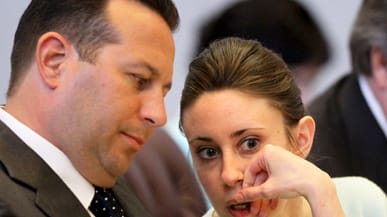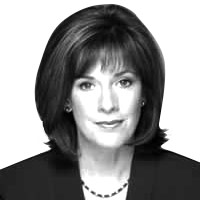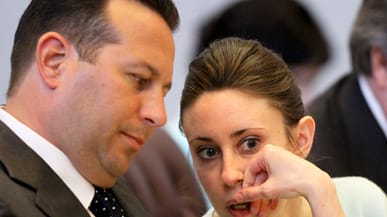It’s now clear this is going to be a case of “The Parents Made Me Do It” subtitled, “Poor Me, Casey Anthony.”

Some people say jury selection is boring, but it’s during the questioning of prospective jurors that the curtain of secrecy surrounding both the prosecution and the defense cases is first lifted.
During four full days of jury selection in a courtroom in Clearwater, Florida, some 100 miles from the scene of the crime in Orlando, it has become clear the state’s case will be straightforward. It will center upon the facts in the case: A tiny child whose mother failed to report her missing for 31 days, a car trunk that smelled like a dead body (according to the child’s own grandparents), and a young, irresponsible single mother who would rather have gone out to party than take care of her 2-year-old daughter.
The state will claim Casey wrapped duct tape around her daughter Caylee’s nose and mouth and dumped her in a wooded area not far from the family home, where her remains were found in December 2008.
One twist was revealed during Prosecutor Linda Drane Burdick’s question to potential juror No. 1232, a bearded father of six who works on the circulation side of the St. Petersburg Times newspaper. “You will be asked to smell an odor (during trial). Do you have any sensitivity to smells?” No one in the room had any doubt that the prosecution is cooking up some sort of human decomposition scratch-and-smell test for this jury.
It was clear from the defense team’s questions that they are planning to throw George and Cindy Anthony under a very speedy bus.
But back to the defense. Up until now, there were only unconfirmed rumors about the approach Casey Anthony’s lawyers would take. After several rounds of questioning the nearly 70 jurors in the final pool, their strategy has come into focus: They may concede her guilt to save her life.
The defendant’s death-penalty expert, lawyer Ann Finnell, asked every jury candidate if certain mitigating factors might sway their decision when it came time to decide Casey Anthony’s sentence.
“If there is a guilty finding, would you be able to take age into account when weighing punishment?”
“How about brain development?”
“Poor impulse control … (and) coping skills?”
“A dysfunctional family?”
“Parents who used a child as a pawn in their disputes?”
“How about (past) verbal, emotional or sexual abuse?”
The bomb was officially dropped. The gaggle of reporters in the spectator seats exchanged knowing glances at Finnell’s first on-the-record mention of the subjects the defense hopes might spare their client a death sentence. They planned to paint Casey Anthony as a survivor of a sexually abusive household who had endured despite some sort of diminished brain function. Through the defense team’s questioning it was also learned that at least one psychologist will be called to testify “about Casey Anthony’s life experience.”
There were questions about whether pre-trial publicity might have caused some to have already made up their minds about Casey Anthony’s innocence or guilt. Candidates were asked if they’d heard anything about Casey’s car or whether testimony from law enforcement would carry more weight than that of a lay person’s statements. And they asked if the panelists had ever heard of George and Cindy Anthony, the defendant’s parents and if so what was their opinion of the grandparents of the deceased?
It was clear from the defense team’s questions that they are planning to throw George and Cindy under a very speedy bus.
There were also telling questions about whether the prospective juror might reach a negative conclusion if Casey Anthony chose not to testify. And, if found guilty and she chose to testify at the punishment phase and still professed her innocence – would the juror be angry enough to impose the death penalty as extra punishment? One was asked point blank, “Would you hold that against her? Is remorse necessary?”
Translated: The defense team is contemplating allowing Casey to testify at some point.
The other two main defense lawyers, Jose Baez and Cheney Mason, were also telling in what they didn’t ask the jury panel. There were no questions about wrongly accused suspects. They didn’t ask if jurors had heard of the scourge of missing children in this country. They didn’t ask if they had ever heard the term “stranger danger” or of the prevalence of abducted children who later turn up as murder victims, their killers never identified.
The courtroom was left with the distinct impression that the defense will concede Casey Anthony did murder her child—but that’s where those mitigating factors Finnell mentioned will come in, with the hope that they will be persuasive enough to spare the life of this 25 year old.
Juror No. 1340, a fortysomething supervisor at a medical courier service, has made the final cut of 12 jurors and eight alternates. During questioning, he revealed that a friend of his was stabbed to death during an armed robbery a few years ago. When asked by Baez to identify the most disturbing news he had heard about the Anthony case, this father of a 7-year-old Catholic schoolgirl took a pause and a deep breath and said, “I guess it was the sheer disdain for the remains. The way the child was left in the woods. I don’t know how one human being could do that to another.”
He added that judging Casey Anthony would be “one of the most important decisions in my life.”
Investigative journalist and syndicated columnist Diane Dimond has covered all manner of celebrity and pop culture stories. Her latest book is Cirque Du Salahi which uncovered the full story behind Tareq and Michaele Salahi, the so-called White House Gate Crashers. Dimond has written extensively about the John Edwards sex scandal for the DailyBeast and she first broke the news that King of Pop Michael Jackson was under investigation for child molestation. She is author of the book, Be Careful Who You Love—Inside the Michael Jackson Case. She lives in New York with her husband, broadcast journalist Michael Schoen.

